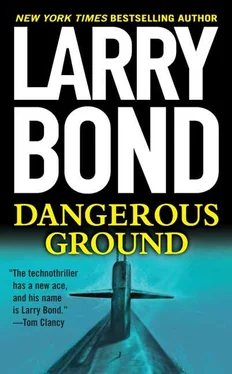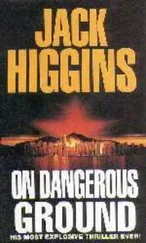“Yes, sir!” Jerry looked back and saw that the last of the frame was just about detached from the sail. Reaching down, Jerry picked up the mike and said, “Maneuvering, bridge, shift reactor coolant pumps to fast speed.”
“Shift reactor coolant pumps to fast speed, bridge, maneuvering aye.”
A few moments later the suitcase speaker blared, “Bridge, maneuvering, reactor coolant pumps are in fast speed.”
“Maneuvering, bridge aye.”
The buoys were clearly visible and they would soon be passing them. The two sailors reported that they were done and the flying bridge had been stowed for sea. Millunzi acknowledged their report and the two went below. A few minutes later the suitcase speaker blared again, “Bridge, Navigator, two hundred yards to the turn point. New course, one six five.”
“Navigator, bridge aye,” replied Jerry.
“Okay, Jerry, this is a small course change, so what are you going to do?”
“Just order the helmsman to use ten degrees left rudder and steady on the new course,” answered Jerry confidently.
“Correct.”
“Bridge, Navigator, mark the turn!”
“Helm, bridge, left ten degrees rudder, steady course one six five.”
“Left ten degrees rudder, steady course one six zero, bridge, helm aye.”
As Memphis started turning, Jerry could feel the difference that eight knots of speed made in her response. She quickly came up on her new course and settled in for the long run through the Long Island and Block Island sounds out to the Atlantic Ocean.
“All right, Jerry, let’s pick up the pace, shall we?” said Millunzi with a gleam in his eye.
“Aye, aye, sir.” Keying the mike again, Jerry spoke, “Helm, bridge, all ahead flank!”
“All ahead flank, bridge, helm aye. Sir, maneuvering answers all ahead flank.”
“Very well, helm.”
As Memphis began to surge ahead, the bow wave grew larger and larger until it was crashing against the base of the sail. The roar of the water as it flowed over the hull was deafening. Jerry felt as if he was at the base of Niagara Falls as tons of water came crashing down. The deck trembled as the main propulsion turbines slammed 35,000 shaft horsepower into the screw, which chewed up the water like a blender. Memphis’ wake was frothy and huge and could be seen for miles in the bright sunlight. Salt spray was thrown high into the air as the bow plowed through the slight rolling waves. And even with the protection of the Plexiglas windscreen, Jerry and the others were still occasionally hit in the face with cold seawater.
Jerry looked over at Al Millunzi and saw that he had removed his ball cap, his black hair streaming in the stiff wind. Meeting Jerry’s gaze, Millunzi leaned over and yelled, “I defy you to find a better mode of transportation than this!”
“Honestly, sir, I don’t think I can!” Jerry yelled back — and he meant every word. True, flying at supersonic speeds, yanking and banking, was a surefire way to get an incredible rush. But what he was feeling now was even stronger. In fact, he probably had so much adrenaline running in his system right now that it was making his stomach a little bit queasy. As the wind and spray whipped by his face, Jerry was finally able to let go of his precious F-18E Super Hornet. His heart and soul now belonged to another: Memphis.
For the next hour, Jerry reveled in his new love. Millunzi quizzed Jerry on various situations they might encounter and pointed out the major landmarks as they sped past them. Of particular interest was Race Rock, the wave-lashed lighthouse on a bunch of rocks at the westernmost tip of Fishers Island. This lighthouse marked the northern end of the passage known as “The Race,” the boundary between Long Island Sound and Block Island Sound.
Traffic was very light, with only a single contact, a long black barge pushed by a tug. It was coming up from the south and appeared to be heading straight for the entrance to the New London harbor channel. It was several miles distant and drawing away, designated “Master Two” by the Contact Coordinator. Since it was held both visually and on radar, it wasn’t a navigation hazard.
Finally Memphis passed between Block Island and Montauk Point on Long Island and entered the Atlantic Ocean proper. As soon as they cleared Long Island, the seas became rougher and the boat started to pitch and roll a little.
“We are now out of the lee of Long Island, so we are no longer being protected from the wind. This means the ride will be rougher for the rest of our run to the dive point,” commented Millunzi.
Now Memphis was heading for the open sea. Instead of land on both sides of them or filling one side of the horizon, it was just a small dark line behind them, growing thinner with each minute. The broad horizon was as novel to Jerry as everything else, but it was unchanging. Within a few minutes, he’d worked out a routine of checking the compass, the radar repeater, the map display, then scanning the horizon with his binoculars. There was no other surface traffic in sight.
“How much longer?” asked Jerry.
“About three hours until we’re past the hundred-fathom curve. About here.” Millunzi tapped the map display.
As Jerry looked down at the instruments, the bow rose a little more steeply than before and fell back to the sea with a noticeable drop. Jerry automatically tightened his grip on the edge of the cockpit and shifted his weight.
Millunzi grinned. “Nothing like this in a fighter, is there?”
“No, we usually flew well above any turbulence,” Jerry answered, “or we were yanking and banking and—” Jerry’s stomach suddenly flipped — or felt like it did. Puzzled, he straightened and tried to continue. “If we did hit turbulence, it was really more like a bumpy road than this pitching or rolling movement.” He had to force the last word out, because as his mind was drawn to the motion, a wave of weakness and nausea passed through him.
“Jerry, what’s wrong? You’re white as a sheet!” Millunzi sounded puzzled and concerned.
Jerry swallowed hard, fighting reflexively to control his rebellious insides. As he struggled, Memphis pitched forward and lurched to the right. His stomach surged upward, and only by a supreme effort did he force its contents back down.
This was impossible. He’d flown all kinds of maneuvers in jet fighters. He couldn’t…”
Hot flashes and cold chills ran across his skin. The nausea was overwhelming. His stomach made another attempt to empty itself, and he flung himself to the side of the cockpit and leaned out as far as he could. It wasn’t a conscious decision to throw up, just an automatic reaction to avoid making a mess in the cockpit.
Millunzi and Stewart watched in amazement as Jerry threw up violently, or more correctly, threw out and then back as the wind caught the vile substance and pulled it aft, spreading it along the sail. It was pure luck that he’d chosen the leeward and not the windward side.
As he threw up, Jerry hoped that once his stomach had emptied itself, the nausea would pass. But just as soon as the first spasm stopped, another began. The gut-churning misery continued for several minutes, until his cramping stomach muscles were too exhausted to contract.
Jerry turned back, leaning weakly on the edge, and wiped his mouth with a handkerchief.
Both Millunzi and Stewart looked at him and burst into laughter. “Look at him. He’s actually green!” the enlisted man exclaimed.
“I’m sorry,” Millunzi apologized, but still laughing. “It was your expression.”
Too near death to respond, Jerry struggled with this new affliction. The novelty and surprise of his seasickness were gone, but the weakness and nausea remained. Could he function? He had to, but all he wanted to do was lie down somewhere. Or throw himself over the side. He really didn’t care.
Читать дальше












